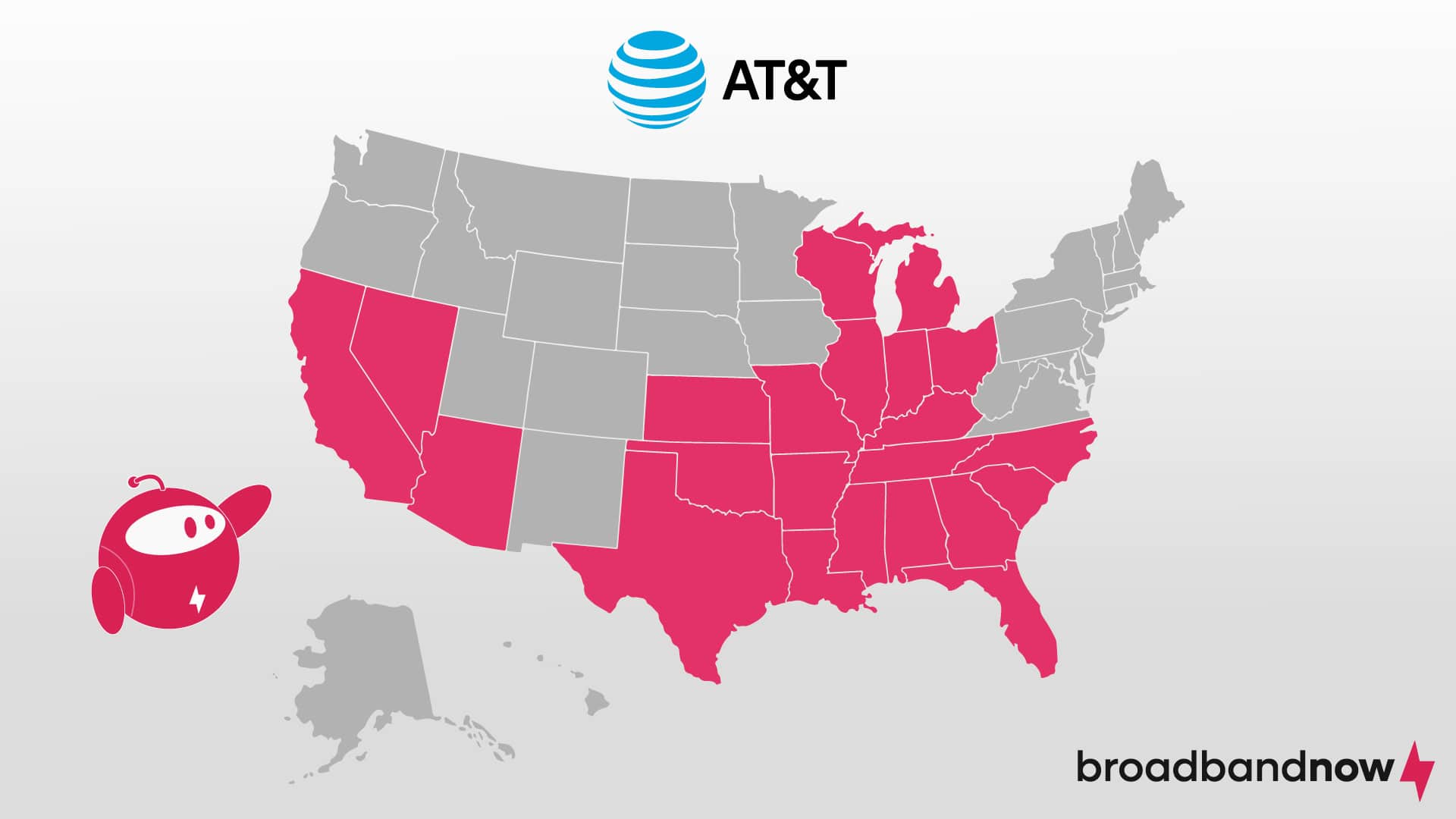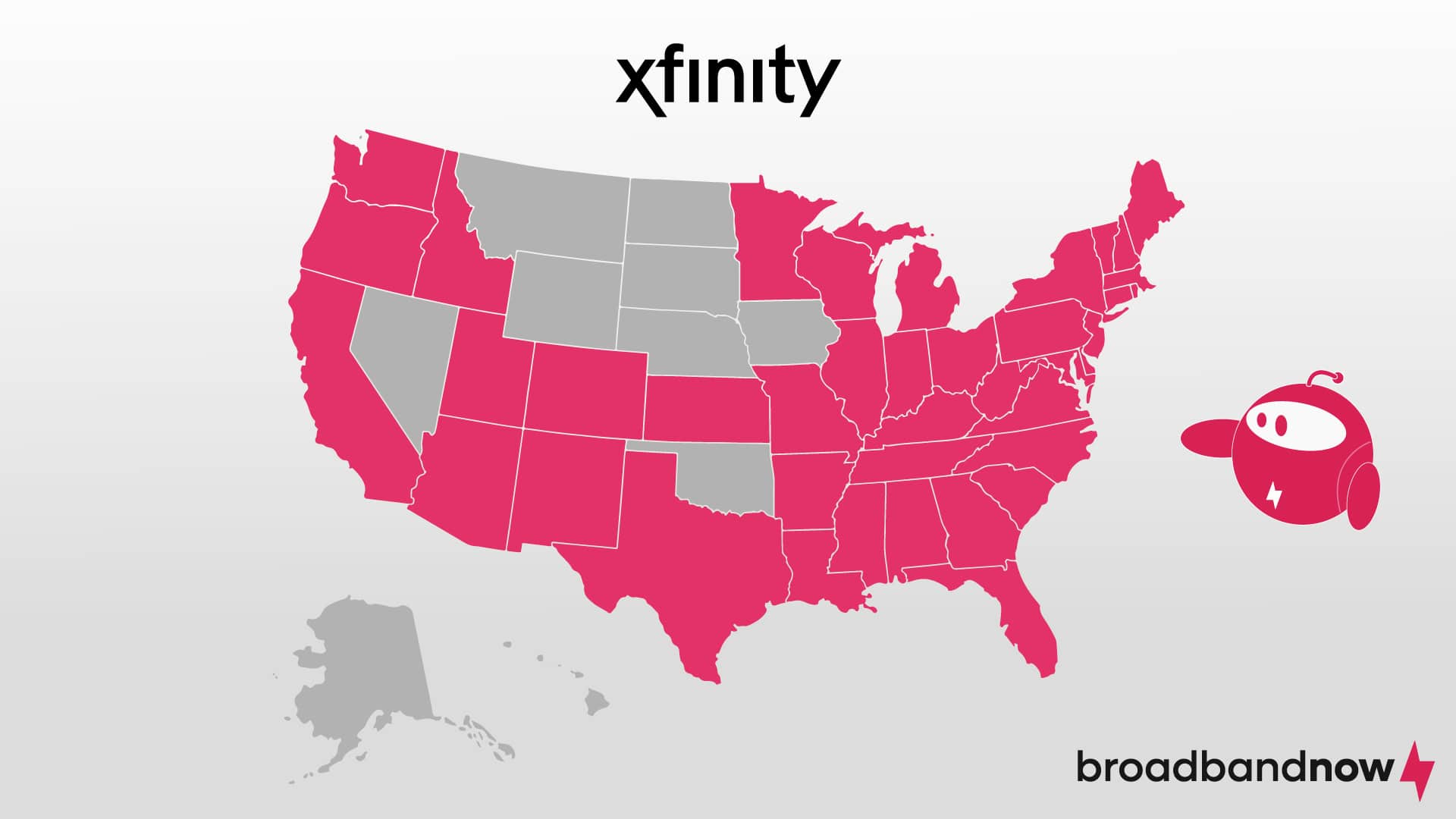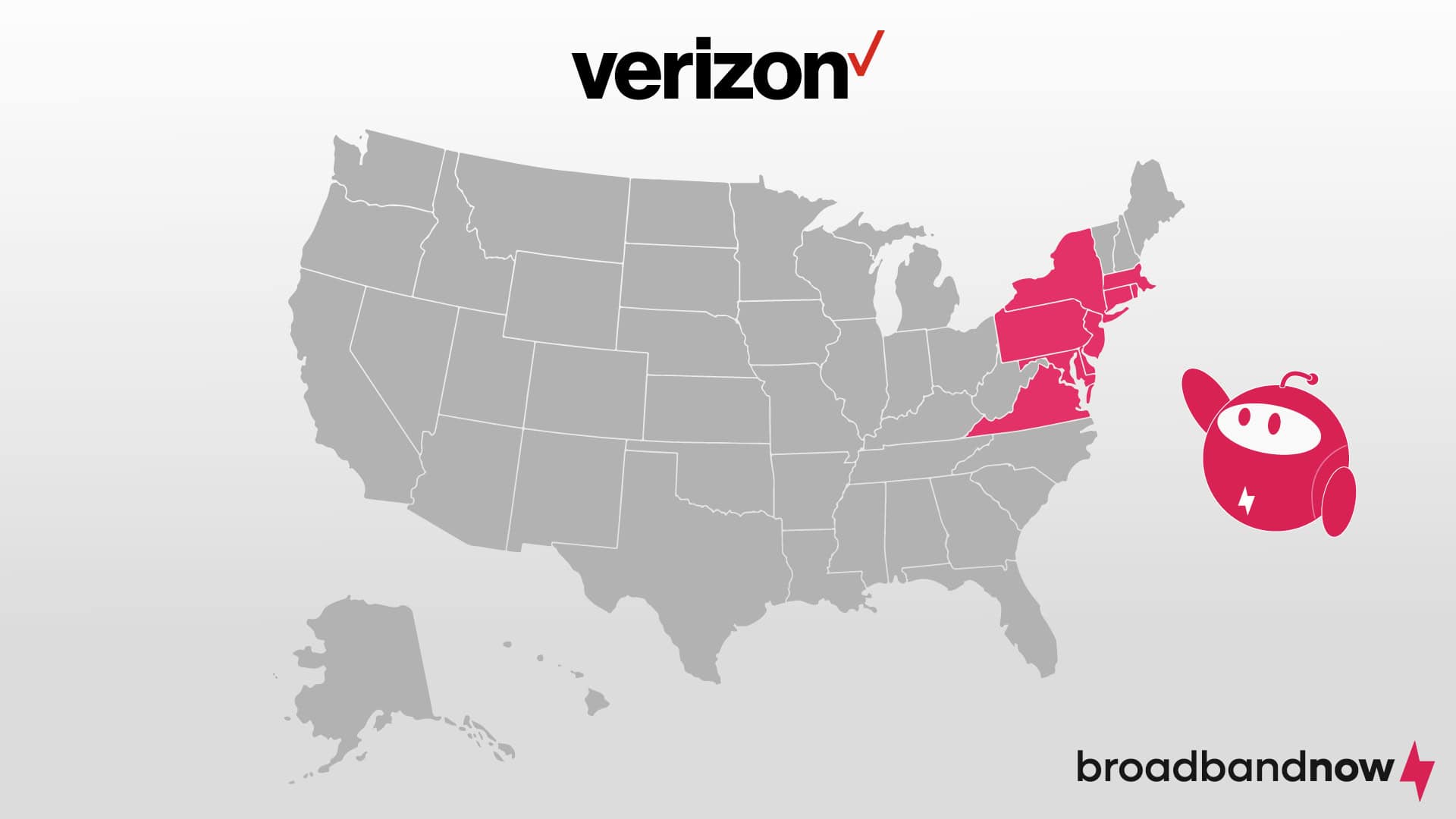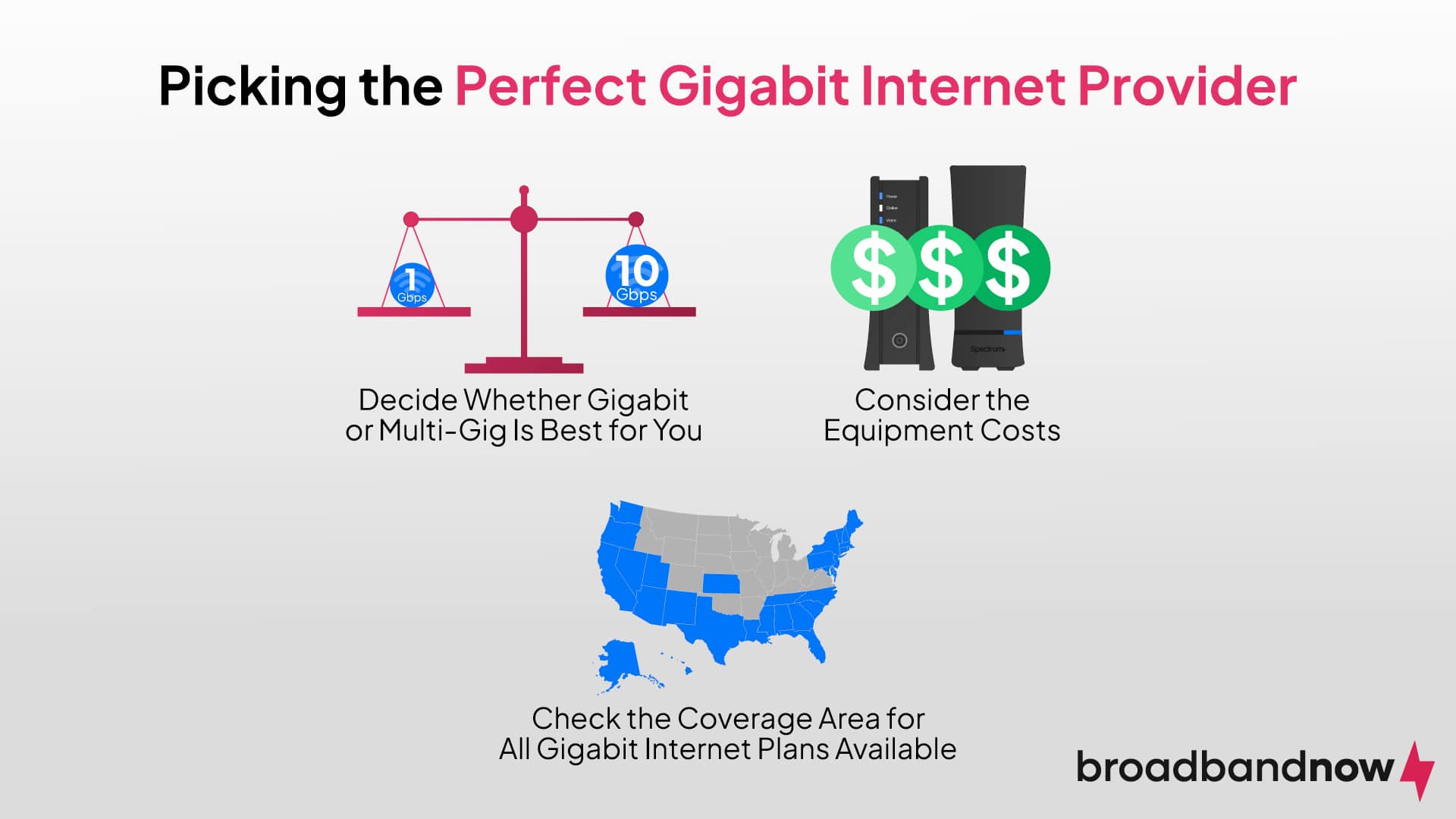Best Gigabit Internet Providers in 2026
AT&T Fiber features gigabit speeds at a reasonable price with customer service scores to back it up.
With so many people using the web regularly, gigabit internet is now considered the “gold standard” for a quality internet connection. While it may not be as necessary for the average internet user, many internet providers now offer a gigabit internet connection option alongside other plans. Gigabit internet’s ultra-fast internet speeds and low buffer rates provide seamless streaming and online experiences, especially for heavy internet users. To help you decide if gigabit internet is right for you, we compiled this comprehensive guide on its features and listed our top gigabit ISP picks based on availability, speed, value, reliability and reputation.
BroadbandNow Bottom Line
If you’re searching for reliable gigabit internet speeds that don’t cost an arm and a leg, AT&T Fiber cannot be beaten. With speeds up to 5 Gbps, AT&T Fiber is a must for engaging in bandwidth-heavy activities online and is made even better with the company’s award-winning customer service. Check out the latest AT&T Fiber internet deals to find the plan that matches your home’s needs.
Navigating the Best No-Contract Internet Providers
- AT&T Fiber (BroadbandNow Top Pick)
- Xfinity (Next Best Gigabit ISP)
- Verizon Fios (Best Limited-Coverage Gigabit ISP)
- Our Top Gigabit ISP Recommendations
- Why You Should Pick a Gigabit ISP
- How We Chose Our Favorite Gigabit Internet Providers
- Methodology for Assessing Internet Providers
- Other Gigabit Internet Providers Worth Mentioning
- Tips for Picking the Perfect Gigabit Internet Provider
- Frequently Asked Questions About Gigabit Internet Providers
AT&T Fiber (BroadbandNow Top Pick)

AT&T Fiber is our top gigabit internet pick for people who want super-fast internet speeds, immense value and outstanding customer service. While other internet providers cap out at just 1 Gbps, AT&T Fiber offers plans with symmetrical speeds up to 5 Gbps. AT&T Fiber provides multiple gigabit internet options that can handle bandwidth-heavy tasks, such as hosting large databases and transferring large files continuously. Even with high-bandwidth use, 5 Gbps could be overkill, so we typically recommend choosing the 2 Gbps or 1 Gbps speeds for most users.
AT&T Fiber plans start as low as $34 per month, with the Internet 1000 plan at just $80 per month for speeds up to 1 Gbps. Best of all, while other internet providers will raise your rates after 12 months, AT&T has no price hikes, meaning your rate stays consistent for the duration of your service. Our in-house editor Andrew prefers AT&T Fiber for late-night gaming sessions because “AT&T Fiber rarely goes out, meaning I don’t get kicked out of my team’s lobby and receive a temporary ban.” Whether you’re a gamer, streamer or at-home entrepreneur, AT&T Fiber has blazing-fast gigabit internet speeds, reasonable prices and excellent customer service to keep you satisfied.
What We Like
- Ultra-fast gigabit internet speeds
- Award-winning customer service record
- Low latencies for no-lag gaming
What We Don't Like
- Multigig plans could be cheaper
Xfinity (Next Best Gigabit ISP)

Ultra-fast internet, multiple service options and wide availability are why Xfinity is our second pick for gigabit internet providers. Xfinity offers gigabit solutions through both its cable and fiber internet connections. While its cable internet plans can reach up to 2 Gbps per month, Xfinity’s brand-new fiber internet network goes up to 10 Gbps. However, Xfinity’s fiber internet is only available in select regions, and signing up costs a pretty penny. But if you want the fastest gigabit internet around, Xfinity can’t be beaten.
Xfinity is an all-around home service provider, providing TV, mobile phone, home phone and home security services with their gigabit internet plans. If your household has more than one home service necessity, you can bundle everything together for a significant discount. What really makes Xfinity a top contender compared to other providers is their vast coverage. As the largest cable internet provider in the U.S., Xfinity reaches more households than major competitors, such as Spectrum. Customers like Claudia Moss praise Xfinity for their continued quality service, saying, “I have had Xfinity as my Internet and mobile provider for several years, and as such, I have had a wonderful experience with the company.” If your household has numerous home services and is looking for the speeds of a gigabit provider, then we recommend Xfinity as your internet provider.
What We Like
- Offers gigabit internet through fiber and cable connections
- Widespread connection availability
- Multiple bundle options for savings
What We Don't Like
- Data caps on internet plans
- Slower upload speeds
Verizon Fios (Best Limited-Coverage Gigabit ISP)

If you’re looking for a reliable gigabit internet plan with unlimited data and without a contract, Verizon Fios might be the best gigabit provider for you. While Verizon’s gigabit internet offerings are a little slower than AT&T or Xfinity, Verizon Fios still has internet plans with speeds reaching up to 2 Gbps. Moreover, Verizon Fios internet is affordable, with plans starting at just $34.99 per month. The service has limited coverage, but if it’s within your coverage area, you can access one of the most reliable networks available.
Along with fast and reliable internet, Verizon’s gigabit internet comes with unlimited data, meaning you can stream and download files to your heart’s content. While this practice is relatively common with gigabit internet plans, it’s not always the case, so it’s a nice benefit. The cherry on top for Verizon is their no-contract policy. All Verizon Fios plans are available without a contract, so you pay monthly for your plan without hidden costs or fees. On top of that, Verizon Fios plans usually come with a multiyear price lock, so you can keep your costs low.
What We Like
- Fast and reliable internet speeds
- No contracts required
- Unlimited data
What We Don't Like
- Limited coverage
Our Top Gigabit ISP Recommendations
| Details | BroadbandNow Top Pick | Next Best Gigabit ISP | Best Limited-Coverage Gigabit ISP |
|---|---|---|---|
| Provider name | AT&T Fiber | Xfinity | Verizon Fios |
| Starting price | $34 per month | $30 per month | $34.99 per month |
| Download speeds (up to) | 5 Gbps | 2 Gbps | 2 Gbps |
| Activation fee | N/A | N/A | N/A |
| Equipment fee | N/A | $15 per month | $15 per month |
| Installation fee | $99 | $39.99 (self-install), $100 (professional) | $99 |
| Data caps | N/A | 1.2 TB | N/A |
| Contracts | No | Yes | No |
| Bundle options | Home phone or mobile phone | TV, home phone, mobile phone or home security | TV, home phone and mobile phone |
| More info | View AT&T Fiber Deals | View Xfinity Deals | View Verizon Fios Deals |
Why Gigabit Internet Could Be Right for You

Most internet users typically don’t need gigabit internet since their tasks don’t require such fast internet speeds. An average household can likely get away with using multiple devices and streaming movies in HD on a slower (and cheaper) internet plan. That said, there are a few reasons why some consumers would still choose to purchase gigabit internet:
- Your household utilizes a lot of upload speed. With fiber gigabit internet plans, upload speeds are symmetrical, meaning it’s just as fast to upload data as it is to download it. If your household streams regularly or frequently transfers large files, fast upload speeds are essential to avoid long wait times.
- Your job requires a lot of bandwidth-heavy tasks. Video editors and other media-heavy careers, for example, rely on fast internet speeds to make their work process run more smoothly and efficiently. Since they’re usually downloading and uploading large media files constantly throughout the day, much of the work takes up a significant amount of bandwidth compared to tasks like browsing the web or sending emails.
- You enjoy the convenience of fast internet. Even if gigabit internet isn’t necessary for all users, it makes some tasks easier to complete. For example, a PC gamer might enjoy the convenience of having their favorite games downloaded in just minutes as well as a low-latency multiplayer connection.
The Limits of Speed: Reading the fine print of any internet plan is essential, but it’s even more vital for gigabit internet plans. Plans that offer internet speeds “up to 1 Gbps” may not provide gigabit internet speeds continuously. Instead, these plans are capable of reaching download speeds up to 1 Gbps, but the upload speeds might be much slower.
How We Chose Our Favorite Gigabit Internet Providers
When you need gigabit speeds to keep up with your online activities, you can’t afford to skimp on service. You’re likely ready to commit to a higher-priced plan and want a service that matches the cost. To choose our top picks, we used these key factors:
- Availability: Our ISP evaluation process emphasizes the geographical coverage provided by each provider. Favorable consideration is given to ISPs with extensive reach spanning across the majority of the U.S., as opposed to those confined to select locations.
- Speed: Offering gigabit speeds isn’t the baseline criteria for our top picks, especially for providers with speeds that don’t always reach a full gigabit. While some providers advertise speed up to 1 Gbps, that’s often the maximum and not the norm. Instead, we focused on providers that offered speeds beyond 1 Gbps to ensure you could access the speed you need.
- Value: Gigabit speeds may be a luxury, but they don’t have to be outlandishly expensive. We narrowed down our top picks to providers offering gigabit speeds at reasonable prices, all with starting prices below $100 per month.
- Reliability: Whether you need gigabit speeds for work or leisure, you don’t want to miss out on a quality connection. We researched providers with a reputation for providing reliable service to ensure you can get high speed without worrying about lag or outages.
- Reputation: Facing internet issues isn’t something anyone wants to deal with. Finding a provider with a reputation for quality customer service can make internet problems a bit easier to manage. We reviewed providers that are known for helping customers when they need it.
Methodology for Assessing Internet Providers

Firsthand interactions with internet providers are an invaluable experience that helps us discover the best providers. From initial setup to ongoing support, immersing ourselves in every aspect provides essential insights for an objective evaluation. We meticulously tested all major U.S. internet providers (alongside numerous smaller ISPs) to offer you direct feedback for making informed decisions, regardless of your location or available internet service providers.
In addition to our hands-on experiences, we drew upon data from various sources to rank these services. We analyzed reports and research from the Federal Communications Commission (FCC) and tapped into the FCC’s Broadband Data Collection to gather detailed information about ISPs. Direct collaboration with internet providers enabled us to obtain the latest plans, pricing, promotions and availability. Our dedicated data collection team unearthed hidden fees and price adjustments, while BroadbandNow Research delved into ISP claims and partnered with major broadband entities such as Microsoft and the NTIA to provide insights on the state of broadband. Furthermore, we consulted services like the American Customer Satisfaction Index (ACSI), J.D. Power and the Better Business Bureau (BBB), along with direct user feedback, to gauge customer satisfaction with internet providers.
Other Gigabit Internet Providers Worth Mentioning
While those three providers are our top picks, they aren’t the only ISPs in town offering gigabit internet plans. Here are some other gigabit internet providers we still think are worth mentioning:
- Spectrum: While it doesn’t have the massive footprint of Xfinity, Spectrum is a close second with its cable internet network. Plus, Spectrum does offer a gigabit plan. That said, upload speeds on Spectrum’s network pale in comparison to a fiber provider.
- CenturyLink: Similar to Verizon Fios, CenturyLink offers gigabit internet plans without contracts or data caps. It’s a great next best option if Verizon Fios is unavailable in your area.
- Frontier: Frontier offers a variety of gigabit internet plans with unlimited data, and the price is on par with other gigabit internet plans. When purchasing from Frontier, it’s important to check for any hidden fees or costs with your plans.
- Ziply Fiber: For those residing in their very limited coverage area, Ziply Fiber boasts impressive speeds up to 50 Gbps. However, that level of speed comes with a high cost. The provider does offer a 10 Gbps plan for much less, but regardless, these levels of speed can be expensive.
- Google Fiber: While not nearly as expensive as Ziply Fiber, Google Fiber features plans up to 8 Gbps. Each of Google Fiber’s plans is competitively priced, but Google is still expanding their network throughout select cities in the country.
Tips for Picking the Perfect Gigabit Internet Provider

When choosing which gigabit internet provider would be best for you, there are several things to consider, especially if it’s your first time purchasing internet or you’re looking to upgrade your current plan. We put together the following tips to help you choose:
- Decide whether gigabit or multigig is best for you. Standard internet plans are usually OK for an average household with multiple streaming devices. However, a multigig internet plan might be better if your internet use requires bandwidth-heavy tasks, such as multimedia production or database management.
- Consider the equipment costs. More powerful internet requires more expensive equipment. Some internet providers offer free equipment and installation with the purchase of an internet plan. In contrast, other plans may require you to purchase equipment separately specifically for a gigabit connection. In any case, keep the equipment cost in mind in addition to the prices for gigabit internet.
- Check the coverage area for all gigabit internet plans available. Gigabit internet is usually provided through fiber internet, which doesn’t offer as much coverage as other internet types. Before committing to gigabit internet, ensure the specific plan you purchase is available in your area.
Frequently Asked Questions About Gigabit Internet Providers
What is gigabit internet?
Gigabit internet is any internet connection with speeds reaching up to 1 gigabit per second (Gbps), or 1,000 megabits per second (Mbps). Some ISPs also offer Gig+ and multigig plans, with speeds ranging from 1.2 Gbps to 10 Gbps. Comparing gigabit vs. multigigabit speeds, 1 Gbps or 2 Gbps plans are more than enough for the average high-bandwidth household.
What activities most likely require gigabit internet?
Jobs that require downloading or uploading large files on a regular basis, such as video editors or companies that specialize in multimedia production, would require gigabit internet. Software engineers who manage large databases also benefit from gigabit internet’s fast speeds as well as its low latency and buffer rates.
How much does gigabit internet cost per month?
While gigabit internet plans are more expensive compared to nongigabit plans, they’re much more affordable than Gig+ and multigig plans. Some ISPs offer deals and discounts for gigabit internet users to keep the price low. Most gigabit internet plans start at around $80 per month.
How fast is gigabit internet?
Starter gigabit internet plans usually range from 940 Mbps to 1 Gbps in terms of download speeds. If you purchase a Gig+ or multigig internet plan, you can expect to experience speeds between 2 Gbps and 10 Gbps.
How does cable and fiber gigabit internet differ?
Fiber gigabit internet comes through fiber-optic cables, while cable gigabit internet comes through coaxial cables. With fiber gigabit internet, you’ll get symmetrical download and upload speeds, while cable internet is asymmetrical, meaning download speeds will far outpace upload speeds.


